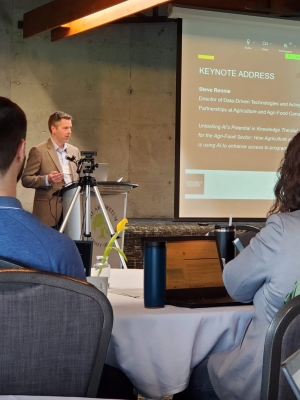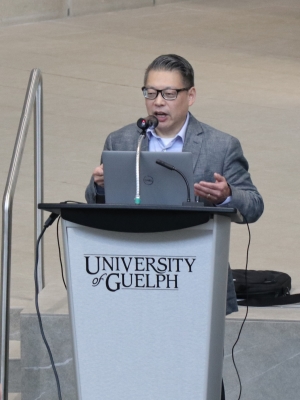
How can KTT practitioners leverage new artificial intelligence (AI) tools to amplify their work? That was the question addressed by two experts at the Ontario Agri-Food Innovation Alliance’s 2024 Knowledge Translation and Transfer (KTT) symposium on April 30.
The Alliance—a collaboration between the Government of Ontario and the University of Guelph— brought together nearly 200 attendees from government, academia, industry and the regional community to share and build skills for the future of KTT in agri-food, with a focus on artificial intelligence (AI).
The future of KTT is customized: AgPal Chat bot
Steve Rennie, director of data-driven technologies and acting director of data partnerships at Agriculture and Agri-Food Canada, shared how he and his team developed a generative AI chat bot—think ChatGPT for agriculture—to help Canadian farmers navigate and apply for government programs.

on unlocking AI’s potential for KTT
Created in response to a federal public service AI challenge (which Rennie’s team won), AgPal Chat (APC) [1] launched in February 2024, only 15 months after inception. According to Rennie, the key to bringing an AI team on board so quickly was the involvement of college co-op students, who brought key capacity and new skills to the team.
“There is potential for AI to revolutionize KTT in agri-food sector,” Rennie said, noting the technology represents a “significant change” to the typical government approach of one-size-fits-all materials and workshops that take time to reach producers.
“AI is iterative, dynamic, personalized and on-demand,” he said. “Producers can make data-driven decisions to optimize yield, minimize waste and ensure a sustainable food supply for all Canadians.”
Rennie said AI can increase the accessibility of information because users can tailor responses to reading level and their preferred format, such as bullet points.
“Winning the challenge was the not the end, it was the beginning of a collaborative effort,” he said. So far, the team has discussed its experience in more than 80 presentations, reducing duplication and preserving resources.
The future of KTT is practical: AI tools for KTT practitioners
Kevin Matsui, managing director of U of G’s Centre for Advancing Responsible and Ethical Artificial Intelligence (CARE-AI) [2], shared practical ways KTT practitioners can use generative AI to save time and brainpower for more important tasks.

Generative AI can be used as a tool or a collaborator, Matsui said. He provided examples of how generative AI tools can save time or effort at work, including the following:
- Quickly creating a custom web application to support conference needs without knowing how to code
- Adjusting the tone or word count of a document to make it more accessible
- Analyzing information faster, such as summarizing a scientific article or a long email thread
The future of KTT is responsible: Ethical AI use
Both Rennie and Matsui stressed the importance of responsible AI use. Responsible use considers privacy, security, fairness, biases, societal impact (e.g., the possibility of “deep fakes” that generate images or videos of a person doing something they did not actually do) and the importance of verifying the information generated by AI and staying up to date.
For users creating new tools, Rennie stressed the importance of maintaining those tools to ensure they remain in compliance with the above responsibilities.
The future of AI in KTT: What’s next?
According to Matsui, the progression in generative AI for individuals is automating tasks using APIs (interfaces that link two computer programs) and custom bots, such as in tech support. The next big disruption is likely to be more sophisticated AI agents that not only provide information interactively, but attempt to resolve problems.
“You want to do things quickly, conserve energy for more important tasks,” he said.
His advice aligned with closing remarks from Adam Meyer, research and innovation branch manager at the Ontario Ministry of Agriculture, Food and Rural Affairs. Meyer said the province is “always embracing new things” and that KTT is a key part of the province’s Grow Ontario Strategy [3].
Guided by KTT practitioners, AI presents new opportunities to extend reach and transform knowledge into use in Ontario. Now, and in the future.
The Ontario Agri-Food Innovation Alliance has supported KTT in agri-food and rural research since 2010. Its KTT Funding Program [4] funds research that advances the science of KTT in the agri-food/rural sectors, or that engages audiences in research or disseminates research findings. See Alliance KTT resources and learn more [4].
